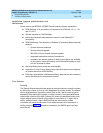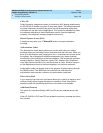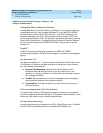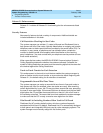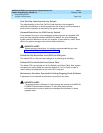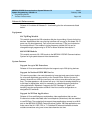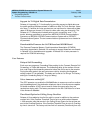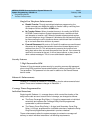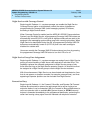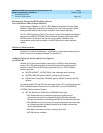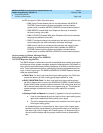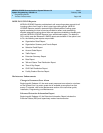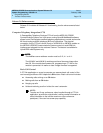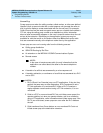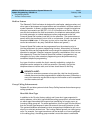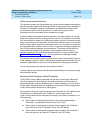
MERLIN LEGEND Communications System Release 6.0
System Programming
555-660-111
Issue 1
February 1998
Programming Basics
Page 1-66Product Enhancements
1
Night Service with Coverage Control 1
Beginning with Release 4.1, a system manager can enable the Night Service
Coverage Control option to automatically control the status of telephones
programmed with Coverage VMS (voice messaging system) Off buttons,
according to Night Service status.
When Coverage Control is enabled and the MERLIN LEGEND Communications
System is put into Night Service, all programmed Coverage VMS Off buttons are
automatically turned off (LED is unlit) and all eligible outside calls are sent to the
assigned voice messaging system calling group with normal ringing delay. When
Night Service is deactivated during the day, all programmed Coverage VMS Off
buttons are automatically turned on (LED is lit) and voice mail coverage is
disabled for outside calls.
Users can override the Coverage VMS Off button status at any time by pressing
the programmed Coverage VMS Off button to turn the LED on or off.
Night Service Group Line Assignment 1
Beginning with Release 4.1, a system manager can assign lines to Night Service
groups to control handling of after-hours calls received on individual lines. This
capability replaces the automatic assignment to Night Service groups of only
those lines that ring on the Night Service operator console. An outside line must
be assigned to a Night Service group to receive Night Service treatment.
With this enhancement, Night Service can be activated and deactivated on lines
that do not appear on operator consoles (for example, personal lines), and lines
appearing at operator positions can be excluded from Night Service.
Forward on Busy 1
Beginning with Release 4.1, the Forward, Follow Me, and Remote Call Forward
features are enhanced to remove the requirement that a call be ringing at an
extension before it can be forwarded. With the Forward on Busy enhancement, a
call to an extension with no available SA (System Access) or ICOM (Intercom)
buttons is forwarded immediately to the programmed destination, preventing the
caller from hearing a busy signal from the intended call recipient’s extension.



